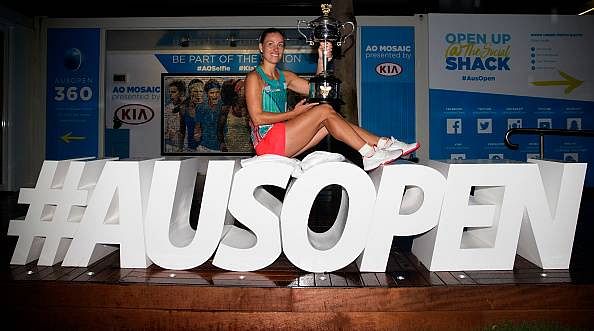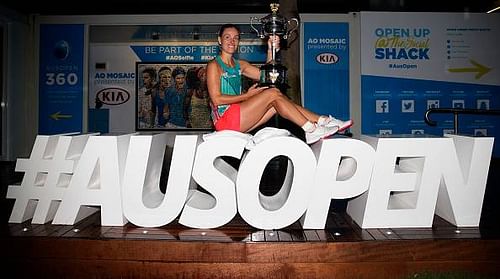
Angelique Kerber and the power of self-belief
“At the end of the day, it’s important that your convictions are stronger than your doubts,” – Novak Djokovic after his four-set semi-final win over Roger Federer at the 2016 Australian Open.
Nobody could have said it better than the World No. 1, who’s now a six-time Australian Open champion. For every player, self-belief is an indispensable ingredient for success. Like it says, ‘faith can move mountains’, a player’s inner conviction can take them a long way and can even help them accomplish a task that had so far seemed utterly insurmountable!
Angelique Kerber was a prime example of it the past fortnight at the Australian Open. For someone who had been consumed by self-doubts time and again, her maiden Grand Slam win at the Melbourne Park was a moment of her re-birth. And for her team and her legion of fans, it was an immensely gratifying feeling to re-discover the player that they have always wanted her to be.
There is so much to learn from Kerber’s journey to her crowning glory. It needs just one switch to flip inside that can work wonders. To believe that you actually belong at the very top tier gets half the job done.
The German didn’t know this for the better part of her career. Just three months ago, at the WTA Finals in Singapore, Kerber had complained of being distracted by the permutations involved in the semi-final qualifying process at that tournament.
She had put herself in a position to make it through to the last-four at the Season-Ender if only she won just a set against the French Open runner-up Lucie Safarova. That one set never came!
It had always been a case of such near-misses for the 28-year-old southpaw, who now resides in Puszczykowo, Poland. There’s never been a shred of doubt about her talent though. Armed with aggressive counter-punching skills, Kerber, popularly known as ‘Angie’ had always been a feisty competitor anyone could get on the opposite side of the net.
Her ability to run down almost every ball made her defense unbreachable for so many top players, including Agnieszka Radwanska and Flavia Pennetta when she first burst onto the spotlight at the 2011 US Open, ranked 92nd. Her semi-final run made everyone take notice of her and she was hailed as the best new hope for German tennis along with the other rising stars.
That impressive performance at a Major shot her ranking up to the top 40 and it meant that she had to deal with the elite players more often. For a while in the initial part of 2012, she could back up the promise she showed at the US Open.
That lefty forehand down-the-line, the angular cross-court backhand and her famous ‘squat shot’ wreaked havoc on Maria Sharapova and Marion Bartoli as she captured her first WTA title at Paris Indoors. More success followed at the Copenhagen Open where she toppled Jelena Jankovic and Caroline Wozniacki for the title.
But it wasn’t meant to be rosy all the time. After another semi-final appearance at a Grand Slam – this time at the 2012 Wimbledon – the struggles ensued.
With a place in the top 10, the pressure of expectations proved to be a tedious burden for the German. The smile would be replaced by a frustrated countenance and she would get too negative on herself if things were not going her way. She lost the ability to pump herself up and maintain the equanimity that is so needed to wriggle out of challenging situations.
Kerber’s mind became an architect of her own downfall. Between 2012 Wimbledon and the end of the 2013 season, she would go on to reach four WTA finals but managed to win only one – at Linz in October, 2013.
The pattern was the same – she would crumble and succumb to three-set losses in each of the finals where she ended up as the runner-up. It was a question of not believing enough in oneself. Most of the times she would let her emotions cloud her thoughts and watch haplessly as the match slipped away slowly from her grip.
Her already low self-confidence would be ebbed away even more in 2014, a year that saw her reach four finals and win none of them. Three out of the four were lost to players ranked lower than her with the only exception being the Stanford final where she was beaten by the World No. 1 Serena Williams.
Kerber gradually got herself drowned in her depths of despair. She lost her first round at the 2015 Australian Open that triggered a setback in five of her next seven matches. Subsequently, the top 10 ranking that had so far embellished her resume too bid her goodbye.
Her desperate search for an answer took her to her legendary compatriot, Steffi Graf after being suggested by her old coach, Torben Beltz with whom she re-united in March. After two training camps with the 22-time Major champion, Kerber came back on the Tour refreshed, rejuvenated and most importantly, with a renewed focus.
Yet there was a mental block that hindered her progress in the most prestigious tournaments. 2015 was a year of mixed fortunes for the German No. 1 who reclaimed her position inside the top 10. She clinched the title in four of the five finals that she reached but inexplicably faltered at the Slams.
She failed to get past the third round in all of the four Slams, slumping to three-set defeats in each. Perhaps she had completely resigned herself to a flawed belief that she simply did not have enough to beat the best when it mattered the most.
That is exactly what she changed at the 2016 Australian Open. “I was not believing too much in myself. Here, it’s changed everything. My coaches and everybody, they saw that I played very good in the practice. They couldn’t understand actually why I can’t transfer it to the matches,” said Kerber after her incredible defeat of Serena in the final.
For the first time, she changed the way she looked at a Slam. The mental change was of paramount importance as it helped her to relax and throw away the extra pressure that had so far hounded her.
A change in attitude proved to be a boon as she survived a match point in her opening round against Japan’s Misaki Doi. That dalliance with defeat only empowered her and doubled her vigour. She learned to trust herself in times of adversities.
There was a new spring in her step, an unprecedented swagger, an amazing serenity under duress and a belief that towered them all. Her refurbished aggressive game propelled her to five consecutive straight-set wins till the final.
The freed up Kerber stopped waiting to feast upon her opponent’s errors and started making charges herself. That attacking instinct came to her rescue against the two-time Australian Open winner, Victoria Azarenka – the very same player whom she had lost to little over two weeks back at the Brisbane summit clash.
Angelique Kerber went to the Australian Open final – her first ever Major final – believing she could win. She was not intimidated by her far more accomplished opponent’s illustrious resume. Nor was she afraid of the fact that the six-time champion Serena had never lost a final at Melbourne Park. Nor did the 21-time Major winning American’s undefeated record in three-set Slam finals make her shaky.
Kerber had her biggest weapon that day that helped to unbelievably dismantle Serena – her own newfound belief.
She had once got the better of Williams at the 2012 Cincinnati event. However, four straight-set defeats to the American followed since then but the German blocked it all out of her mind as she set her sights on the biggest prize – the Daphne Akhurst Memorial Cup. That galvanized her into surprising the World No. 1 with two drop shots at a critical juncture of the third set. Her efforts were rewarded as she secured the vital break to go up 4-2 that ultimately gave her the much-coveted chance to lay her hands on her maiden Major trophy.
Kerber’s superb attitude and her calmness got applauded by the World No. 1 herself after her defeat. “She had an attitude that I think a lot of people can learn from: just to always stay positive and to never give up,” said Williams.
The new Australian Open champion’s story is a lesson to learn from for many others who sweat it out in the sport’s middle tiers. She is an inspiration for the perpetual underdogs who can now hope to emulate her.
For every player, their biggest strength lies inside. It is not the number of hours they spend on the practice courts or how many times they have beaten the game’s best.
It is that one word that works like a magic wand – self-belief.
The new World No. 2 Kerber showed that it is possible to dream big if one has that conviction in copious amounts, free from the shadow of a doubt.
